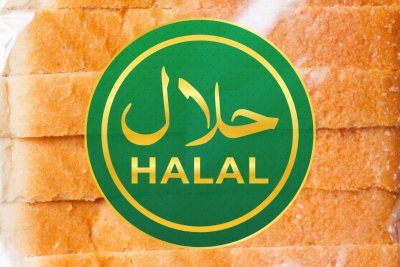Sustain / Real Bread Campaign / Articles
Halal bread
Why are some industrial dough products certified halal?

You are unlikely to see a halal logo in your local Real Bread bakery, because Real Bread is inherently halal. Flour, water, yeast, salt (and most other ingredients commonly used in Real Bread making) are acceptable within Muslim dietary requirements.
Why, then, do labels of some Chorleywood Process loaves, and other industrial dough products, bear a halal certification mark?
What is halal?
Halal is conceptual, so contrary to what some social media commenters seem to believe (‘I don’t want halal put in my bread!’), it's not something that can be added to a loaf.* Certified halal food simply means that an accreditation body has signed it off as acceptable for Muslims to eat.
Of course, everyone else can also eat halal food, unless it doesn't meet their own dietary requirements anyway – for example, a certified halal beef cheeseburger is no use to a vegan, Hindu or orthodox Jew, but not because it's haram (see below).
Why are some industrial loaves marked as halal?
Presumably any industrial dough fabricator paying for halal certification does so to assure Muslim customers that a particular product does not contain any haram substance.
Haram food
Foods that don't conform to Islamic principles are known as haram, meaning forbidden or unlawful. Haram foods include pork and pork derivatives (e.g. porcine gelatine), blood, alcohol, and meat / products of animals that were not raised and slaughtered according to halal regulations. A food’s halal status will be compromised if it contains or comes into contact with a haram substance. Here are some examples:
Ingredients
- Lard: once common in traditional bread making, and perhaps formerly used in some industrial dough products.
All ingredients have to be listed on the label.
Additives
- Glycerine / glycerol (E422), if of porcine (pig) origin. Used in some industrial flatbreads and gluten-free products.
- Emulsifiers, including mono-and diglycerides of fatty acids (E471), diacetyl tartaric acid esters of mono- and diglycerides of fatty acids (E472e), sodium stearoyl-2-lactylate (E481), if of porcine origin.
All additives have to be listed on the label. Additives are not used in Real Bread making.
‘Processing aids’
- Phospholipase A2, if of porcine origin.
- L-cysteine hydrochloride, if produced from pig bristles or feathers from uncertified poultry.
Food labelling law allows manufacturers to choose not to declare the use of an additive if it is deemed to be a ‘processing aid’. ‘Processing aids’ are not used in Real Bread making.
‘Processing aids’ and other additives can be produced by a range of means from a variety of sources (animal, vegetable, microbial, fungal etc.) If a halal certification body is uncertain about the source of an additive, it may be declared as mushbooh (doubtful).
From the Stick One on ‘em investigation conducted by the Real Bread Campaign in 2009, we concluded that it was highly unlikely that any industrial dough fabricator was knowingly using any processing aid of animal or human origin.
See also
For further information (and for answers to any questions you might have about) Islamic food principles and practices, please contact a halal certification body, such as:
*Nor does a halal certification mark mean a loaf has had Islamic prayers said over it, that it has to dress modestly, or that the cereal plants from which it was made were slaughtered in accordance with Islamic principles.
While the issue of stunning animals prior to slaughter is an issue that falls outside the Real Bread Campaign's work, some halal certification bodies permit it, others don't.
Published Friday 7 November 2025
Real Bread Campaign: Finding and sharing ways to make bread better for us, our communities and planet.

